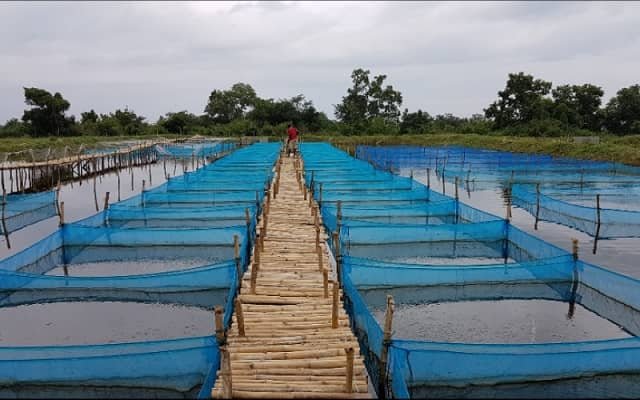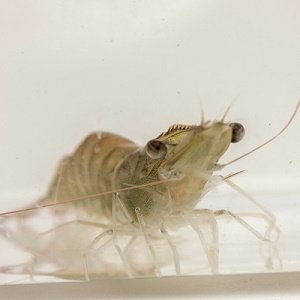WorldFish will embark on new research to create more resilient fish with characteristics such as disease resistance and more effective feed utilization. Based on a roadmap developed with world experts at a WorldFish-hosted fish breeding workshop on 23–24 May at The Roslin Institute in Edinburgh, the research will use advanced techniques such as genomic selection to introduce these characteristics into its improved tilapia strains.
Since 1988, WorldFish has used selective breeding to develop and manage the fast-growing Genetically Improved Farmed Tilapia (GIFT) strain. The strain has been disseminated to at least 16 countries, mostly in the developing world, and is grown by millions of small-scale fish farmers for food, income and nutrition across the globe.
Use of genomic selection tools, which enable the selection of animals based on genetic markers, will allow WorldFish to expand its GIFT research beyond a growth-only focus and introduce selection for characteristics that are otherwise difficult to measure, such as resilience and feed efficiency. Genomic selection has enabled a step change in the rate of genetic improvement of terrestrial livestock, and has the potential to do the same in fish.
Expansion of GIFT research is a key part of the CGIAR Research Program on fish (FISH) and supports WorldFish efforts under its sustainable aquaculture program to increase the productivity of small-scale aquaculture to meet growing global demand for fish.
John Benzie, Program Leader, Sustainable Aquaculture, WorldFish: “Incorporating new traits in the breeding program for GIFT will help fish farmers prepare for future challenges such as climate change and increasing evidence of disease risks. This will particularly benefit farmers in Africa and Asia, where tilapia is critical for food security yet farmers often have limited access to improved fish breeds suited to local conditions.”
Ross Houston, Group Leader, The Roslin Institute: “Aquaculture production needs to increase by 40 percent by 2030 to meet global demands for fish. Nile tilapia (Oreochromis niloticus) is arguably the world’s most important food fish, and plays a key role in tackling rural poverty in developing countries. The innovations in genetic improvement mapped out in this workshop are an important step toward achieving these ambitious goals.”
Attendees of the workshop included experts from WorldFish’s Malaysian and Egyptian bases, The Roslin Institute, the Swedish University of Agricultural Sciences, The University of Stirling’s Institute of Aquaculture, the Earlham Institute, CIRAD and the Animal Breeding and Genetics group of Wageningen University and Research.
The roadmap will feed into a strategy for the genetic improvement and dissemination of GIFT seed in Africa, the further development of which will take place at the Genetics Network meeting being hosted by WorldFish at the World Aquaculture 2017 conference in Cape Town on 26–30 June.
Stay Always Informed
Join our communities to instantly receive the most important news, reports, and analysis from the aquaculture industry.
About WorldFish
WorldFish is an international, nonprofit research organization that harnesses the potential of fisheries and aquaculture to reduce hunger and poverty. Globally, more than one billion poor people obtain most of their animal protein from fish and 800 million depend on fisheries and aquaculture for their livelihoods. WorldFish is a member of CGIAR, a global research partnership for a food-secure future.
About CGIAR
CGIAR is a global research partnership for a food-secure future. Its science is carried out by the 15 research Centers that are members of the CGIAR Consortium in collaboration with hundreds of partners.
Reference (open):
Roger L. Vallejo, Timothy D. Leeds, Guangtu Gao, James E. Parsons, Kyle E. Martin, Jason P. Evenhuis, Breno O. Fragomeni, Gregory D. Wiens and Yniv Palti. Genomic selection models double the accuracy of predicted breeding values for bacterial cold water disease resistance compared to a traditional pedigree-based model in rainbow trout aquaculture. Genetics Selection Evolution, 2017, 49:17. DOI: 10.1186/s12711-017-0293-6
https://gsejournal.biomedcentral.com/articles/10.1186/s12711-017-0293-6
Editor at the digital magazine AquaHoy. He holds a degree in Aquaculture Biology from the National University of Santa (UNS) and a Master’s degree in Science and Innovation Management from the Polytechnic University of Valencia, with postgraduate diplomas in Business Innovation and Innovation Management. He possesses extensive experience in the aquaculture and fisheries sector, having led the Fisheries Innovation Unit of the National Program for Innovation in Fisheries and Aquaculture (PNIPA). He has served as a senior consultant in technology watch, an innovation project formulator and advisor, and a lecturer at UNS. He is a member of the Peruvian College of Biologists and was recognized by the World Aquaculture Society (WAS) in 2016 for his contribution to aquaculture.







